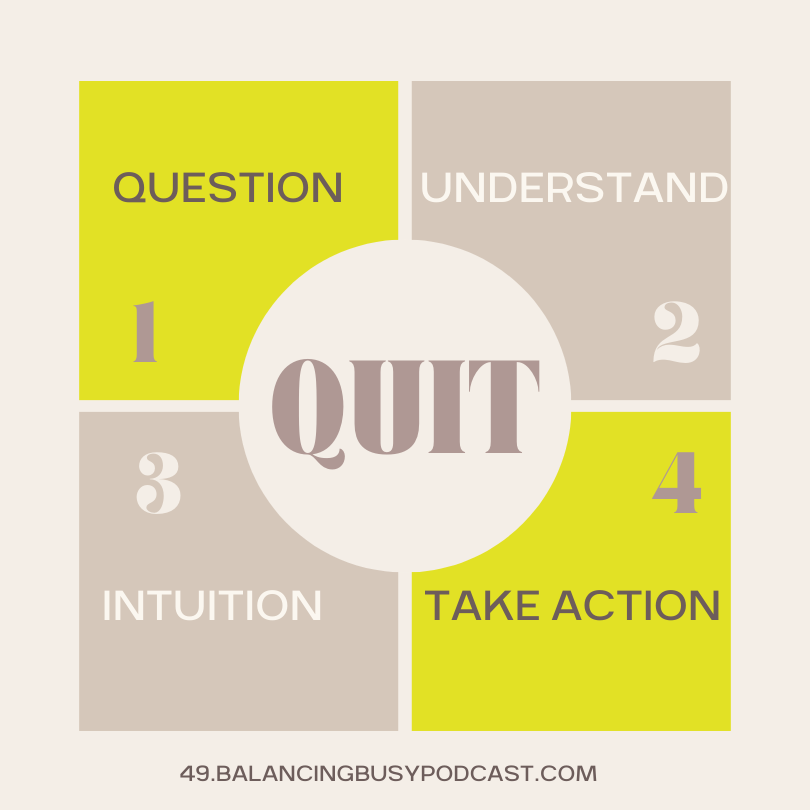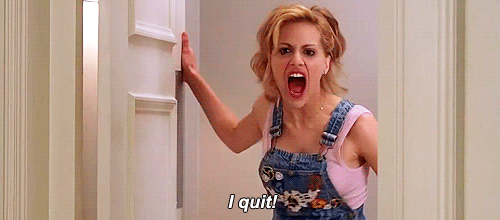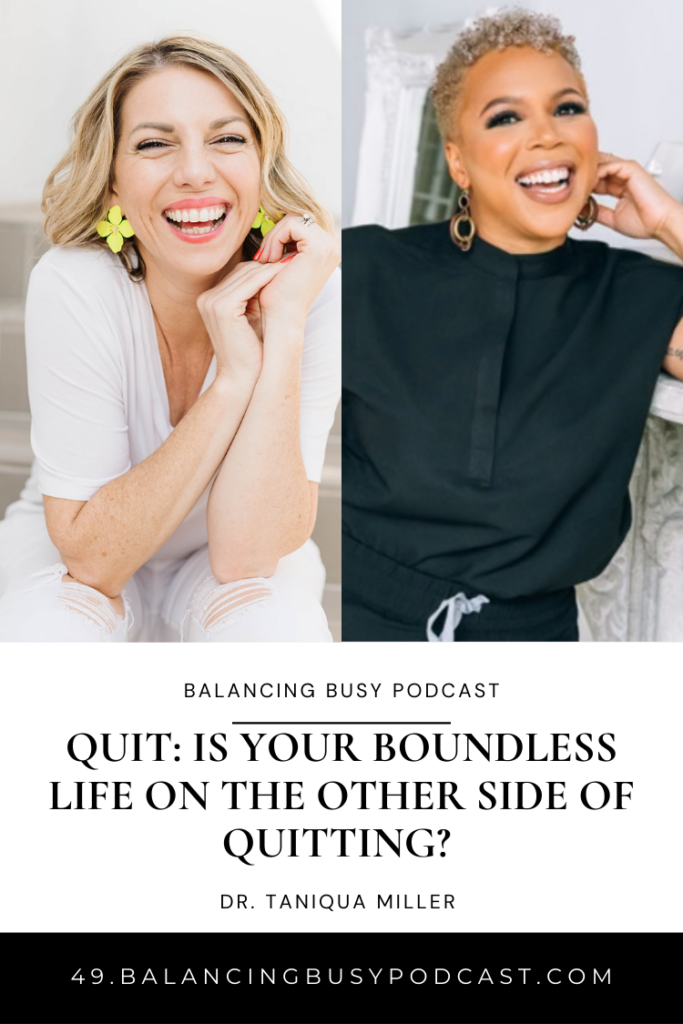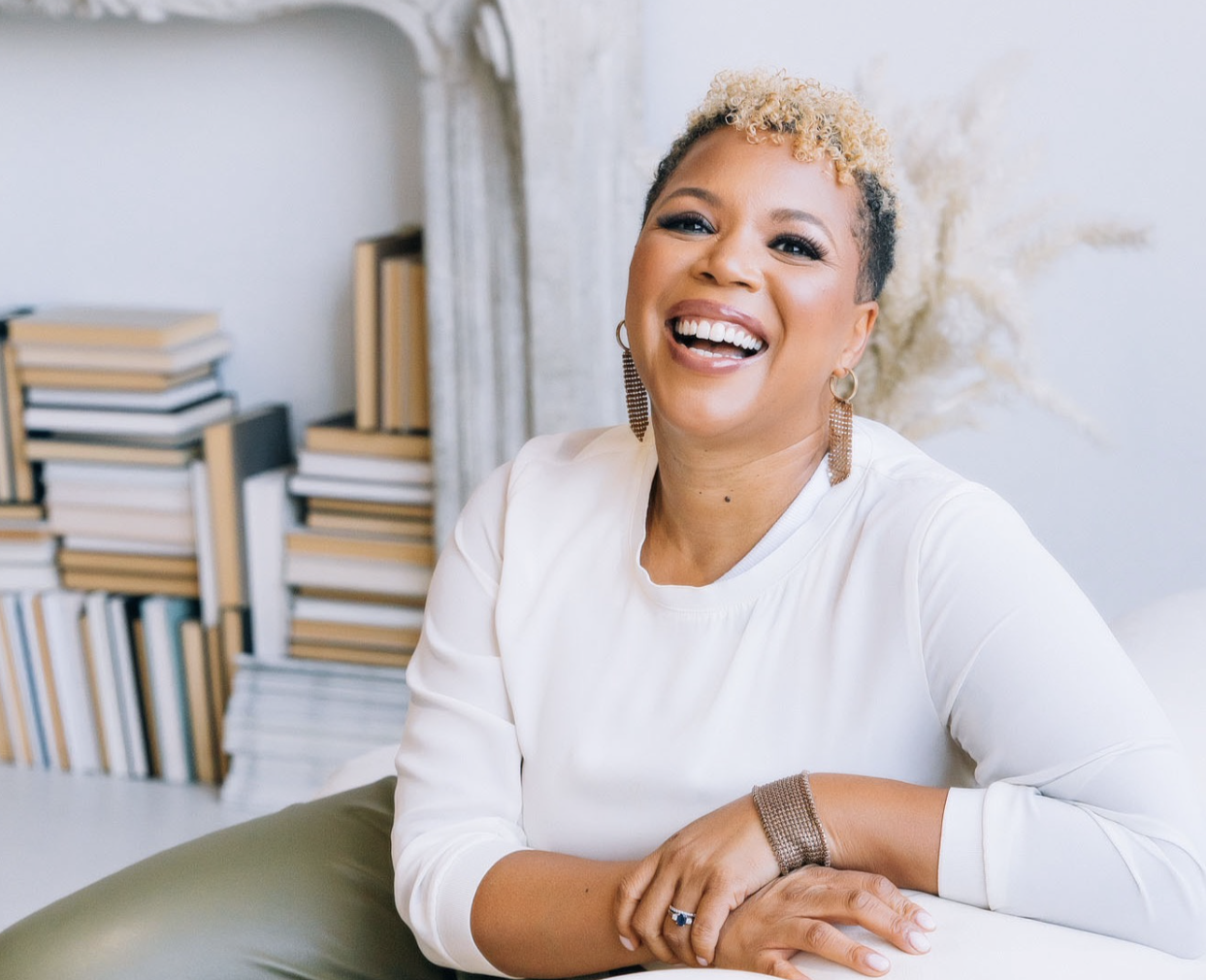[00:00:00] Leah: . I’m Leah Rele, and this is Balancing Busy. What in the heck do you do if you’ve gotten everything you said you wanted and you are not happy? Are you broken?
[00:00:13] And what do we do for all of us who are coming to that phase where we are entering perimenopause? We are in the, I guess, mid. Section of our lives, and we want to age in a way that feels good. Today my guest is Dr. Qua Miller, and oh my gosh, she is amazing. Okay, so she is a board certified OB G Y N and National Certified Menopause Practitioner. She prides herself on her commitment to supporting women and girls through their reproduction transitions and beyond through her educational platforms, qua md, she empowers women of color to embrace a.
[00:00:53] Boundless midlife. After 14 years in academic medicine, Dr. Miller experienced her own professional burnout and made the decision to pause her clinical practice, which we are going to talk about in this episode. During her time away, she read a devotional giving her a new call to action b Boundless as a first generation American college graduate.
[00:01:15] And physician. She now tells her story of burnout and her secret weapon to living a boundless life. Spoiler alert, it’s quitting. She is a transformative speaker and professional coach for her signature program, burnout to Boundless. So you can imagine I have so much that I wanna cover with her. I wanna talk about, I mean, Kate, this is a woman who has reached all of the levels of success and still wasn’t feeling satisfied.
[00:01:45] Is there even hope for the rest of us? . Get ready to learn how we can. Enjoy our midlife better, how we can support ourselves when we recognize it’s time to let go and all the rest.
[00:01:59] This episode is so good. Let’s jump in.
[00:02:08] Dr. Qua Miller, I am so excited to talk with you today. Thank you so much for being on the Balancing Busy Podcast.
[00:02:42] Dr. Miller: Oh, thank you so much for having me. I’m so excited.
[00:02:46] Leah: Oh, I just talking with you beforehand. Like I’m get, I like feel giddy. I’m like so excited to talk with you. So will you, just so everyone else can get the giddiness with me, can you just take a moment and just share a little bit about your story?
[00:02:59] Dr. Miller: Yes. Thank you for that. So I am a Bronx girl, city girl, through and through. I say that I am like Shonda Rhimes says first only different. So I was the first to go to college in my family. I was first generation American. My family immigrated here when, um, they were teenagers and I was the first to go to medical school.
[00:03:20] So I was like up in the ante every rung, if you can imagine. And so for me and my family, I was the epitome of success. And for the most part it came pretty easy to me. And so as I like went through medical school and I went through training, I did what was kind of the blueprint, which was to go through training and get a job.
[00:03:40] And in my naive mind as an early 30 something, I really thought that that was gonna be it, that I was gonna make my career. And that’s kind of the model in medicine, that you pick a place and you stay there. Well, In academic medicine, there is the assumption that you’ll move on with promotion, which is a little different from promotion.
[00:04:00] Traditionally, and I was working so hard, I was creating so many programs. I was joining so many committees. I was like really trying to check boxes so that I can be recognized, that I can be honored with this great thing of promotion. And every meeting that I had, I kept being told, you need to do more.
[00:04:20] And that translated to, you’re not doing enough, you’re not working hard enough, you’re not enough. And I remember after pick one particular day, I was in my car heading to my clinic after a very stressful meeting and one of the committees that I was sitting on and I was started having chest pain. Now I’ve experienced anxiety before.
[00:04:43] I’ve had chest pain before, and in fact, I did my due diligence cuz I am physician, you know, and I had this full workup and it was like you have anxiety and I could manage it with breathing and relaxation techniques, but this was long time coming over several weeks where I was just ignoring that pain and it reached a fever pitch that I couldn’t catch my breath.
[00:05:03] It felt like a full on panic attack and I just started sobbing. And it was like I was evaluating all of my life, like how did I get here? I’ve had so many incredible experiences. I’ve overcome so much being the first in so many things, and I’m behind the wheel of my car crying, not because I was like burnt out or having the actual chest pain, but I was so disappointed that this is where my life had carried me, that I had sacrificed so much of my home life.
[00:05:32] With my children, with my spouse trying to achieve. And it still wasn’t enough. And so with the advice of a friend at work, um, I took a leave, which in medicine you never really have people take leaves. They literally just leave. But this idea that like, I’m entitled to time off. Was just so foreign to me, but it was in that short period of time, which was only four weeks that I made the decision to do it differently because the way that I was doing it wasn’t working.
[00:06:03] Leah: Okay. So I’m gonna take a moment and toot your horn for you because, because I, I just wanna, I just wanna say this and I, I, I hope it helps us as women, You said, oh, I went to school and you know, Emma, Emma, md. Okay. She went to Yale First Guys, and then Harvard, K, Harvard Medical School. That’s where she went.
[00:06:26] Okay. So I’m just saying if you, if you feel like you’re not enough, what the heck are the rest
[00:06:34] Dr. Miller: of us supposed to do? Right. Okay. Like,
[00:06:37] Leah: like, um, this sucks. So, you know, this feeling of like, Is this really as good as it gets? I’ve done all the things, checked every single one of them, and I’m still being told, you need to do more. This is enough. And, and I’m, I’m gonna reframe this for a second because I think sometimes we do this to ourselves. For anyone who’s an entrepreneur, I, I created my own little prison. You know, I kept saying like, oh, you feel good, but for like a minute, you’re gonna give yourself one minute to celebrate the success you just had.
[00:07:10] But now, now you gotta climb. You gotta get to this next one. And, and kept thinking like, at what point do I actually feel like it is enough? Yes. Yes, yes. And so, How, how do we deal with those feelings? Like, I mean, legitimately if, if Dr. Qua with her envy from Harvard can’t feel like enough, like how, how do we find enough
[00:07:40] Dr. Miller: Sue?
[00:07:41] I did what I was taught, right? I did not wanna sit in discomfort. I was off for four weeks and I did all the things. Okay? I set up all the coffee chats. I was like, I’m gonna read every book about burnout. I was Googling burnout, recovery, and I literally was like, I’m gonna fix myself because something’s wrong with me, that I’m here.
[00:07:59] And I had a couple of chats and it was really inspiring, but I realized that I was looking outside for the answer for what I needed, which essentially was quitting, which we gonna get into. And I remember a coach that I was working with literally said, I’ll tell you all the books to read, but I’ll tell you anything you want to know about burnout.
[00:08:20] But the first thing I need you to do is sit still. And really feel the shame and this isolation that you’re feeling. Ooh, the tears and so, so lots of crying, lots of that. But I like really sat with myself. I know that sounds kind of like cliche, but I literally would sit in silence with a journal, something that I was uncomfortable doing because I’m always doing, and little whispers started coming to me and it was like, you don’t need fixing.
[00:08:47] You need to be in your strengths. You need to first know them. You need to forgive yourself for getting to this place where you’re not happy with your life and building self-trust, leaning into your inner voice, leaning into that intuition, that’s gonna bring you back to little Qua from the Bronx .
[00:09:06] And so that was where it started leaning into intu intuition and really trusting myself and taking steps to trust myself. One of the first things that I did was taking a strengths assessment test. I did Clifton strengths in medical school. I was never exposed to any of this, and it told me what I knew.
[00:09:31] Which is that I love to roll my mouth and I love to speak, and that was always something that was a strength of mine. And I loved connecting with audiences and telling stories and putting things together. And so I was like, I need to make space for this and I wanna professionally speak. Well, if I’m doing all of these things over here with the committees and the meetings that really have no relevance to my life on a daily basis.
[00:09:59] How can I make space for that? And the only solution was to quit, to start quitting. And so I started letting go of the things that really weren’t serving me. And at first it was scary ,
[00:10:12] Leah: Right? Because people can hear this, they’re like, they’re like, oh, I’m having a hard time breathing.
[00:10:17] Just thinking about like you quitting, let alone me quitting something. Right? So, so will you kind of talk through like how hard that really was? Yeah.
[00:10:26] Dr. Miller: So Quit actually is an acronym. It’s my quit formula. So, I questioned everything that I was doing. Why was I doing it? Was it because of passion? Was it because of obligation, expectation?
[00:10:41] And I really centered, like, why was I doing this? No one else. Then you was understand the impact. If I stay or if I go. Me no one else. And that’s the thing, sometimes we’re like, this person will be disappointed. Um, this person needs me, but the airline industry tells you to put your mask on first. So I was the priority and I would ask myself, if I stay here, will I have further harm?
[00:11:07] Will it take me away from all of these other wonderful things that I wanna do? And then I is all about leaning into that intuition. Sit with yourself for a little bit, be a little quiet. We know the answer. In fact, we ask for it. We pray for it. And then sometimes the answer comes to us, hits us upside the head and we totally ignore it.
[00:11:27] Right? A hundred percent. We’re like, no, sorry.
[00:11:30] Leah: I must have missed, misunderstood that cuz surely that’s not what you just told me. Right? And we just, yes.
[00:11:36] Dr. Miller: Keep going. Yeah. So true in roles. I was in role, like I was in a role that I literally said out loud to myself that while I enjoy this work, I don’t wanna do this.
[00:11:45] And it was quickly followed by it, you know, I mean, there’s no one else to do it and everything like that. And that is the role that took me out. And so then the tea is take action, do something. And so when I started stepping away from things, I didn’t just like show up guns blazing and say, all right, qu, you know, the first thing that I did was I wrote a resignation letter and I kept it in my draft’s folder.
[00:12:11] And I sat with it, but I put everything out there and then it wasn’t so scary. And when the time was right, when I was ready, I hit send. And yes, it was scary, but there was something that was a little reish about it. Let me tell you, I was feeling really irreverent, but I, but I was sending a new narrative to my brain that like my world didn’t fall apart.
[00:12:36] I’m still here. I still have a family that loves me. I still have a roof over my head. I’m okay. And it was the practice of that that made it easier over time. And then I could take that new space, energy, time and pour it into the things that really lit me up, like professional speaking, like my coaching practice.
[00:13:00] And so it just got easier and easier.
[00:13:03] Leah: Oh, so good. Okay. Oh, there’s so many ways I want to go with this. Okay. So, um, for, with, with the understanding the impact, if I say yes or if I say no, if I stay or if I go, that is so powerful. I started asking myself. What does this Yes mean no to? I started finally recognizing that every single yes is a no somewhere.
[00:13:28] And so I was like, okay. When I said, and, and you know what the truth was almost. Almost all the time. The no was to my family. The no was to my kids. It was to my husband. It was to the people and the things that I said mattered most. And yet all of these yeses in my career were direct nos to them.
[00:13:50] And when I started realizing that, that hit me, and, and I started being able to release that, that. Guilt or worry about missing out on opportunities there in recognizing that the biggest opportunity that I had was as a mother and that I did not want to mess that up, so, oh, okay. So, but I have a question for you.
[00:14:14] What was the conversation like with your hubby when you are saying, uh, I don’t think I wanna do this anymore, so, I mean, cuz. Cuz we’re not the only ones, right? We don’t get to make these decisions in the vacuum. Yeah. So what was that like?
[00:14:31] Dr. Miller: So confession, I’m really scrappy, so I had a plan. I think the restlessness for me was building over years and he saw how miserable I was.
[00:14:46] And we’ve been working for a while, so we have savings and things like that, and I contribute to my household. I’m a physician, I contribute to my household, but I think the pain taking time off, and in the time that I took off, I literally returned to myself. He was like, oh, there she goes. That’s my wife, you know?
[00:15:02] And. I tried to make it work and I think that something came up at work that I was expressing that I wanted to do something or didn’t wanna do something and there was a lot of lip service being paid to me. And he made a comment, he was like, I think it’s time for you to move on. And the night before I submitted my letter, I had already had it written cuz I had to take action.
[00:15:27] I said, I need you to be on board. And he was like, I’m on board. Now, truthfully, I had a little buffer because it took me 90 days to step down. So once I put in my resignation, I didn’t leave it for several months, but that was the time that I needed to get really scrappy. And I said, what do I wanna do? And I started like, kind of like applying to contract jobs, pitching, consulting work, and, and really kind of piecing together a little salary for myself.
[00:16:00] And by doing that one it was fun. Like I was like really flexing my talents in a very different way, but it proves to myself that I’ll be okay. And that I feel like is why you have hopefully a supportive partner. He’s been great. Um, I’m getting restless now cause I miss my patients and so I’m planning my return back to clinical medicine sooner than I thought I would because I really miss, um, just interacting with patients.
[00:16:31] And so he’s just going along for the wa for the ride.
[00:16:35] Leah: But you’re realizing you’re gonna do it your way. Yes. You are going to. Create the frame by which this new image is going to fit. And that’s what I think is so powerful. And that was, that was my experience too. I even though I, I’m gonna have to admit here, like I created my own, my own torture chamber.
[00:16:58] Okay? Like I was, I was my own boss and I created it myself, but I, I had a very similar where. My husband was seeing it all and he was experiencing it. He was feeling like, I miss you. I want time with you. I’m tired of always competing and losing to. To your, your career. Right. And so he was feeling that, but it’s still really scary.
[00:17:24] Mm-hmm. It’s still scary. Mm-hmm. And, and us, same thing. You know, we did have a savings. I am scrappy and I got a lot of gumption, and you put me against a wall and I, I’m gonna figure out how to get my way out. Right. Right. And so and so, That stepping away can be so powerful. And I think one thing that’s so important for women to realize is it does not have to be forever.
[00:17:47] There are very few things in our lives that are actually forever, but we approach all these things like, like it’s the end. Indeed. If we, indeed, if we stop something, if we start something that that’s the only option. And it just, it isn’t, it doesn’t have to be,
[00:18:05] Dr. Miller: no. And, and I think like the timing of this was so perfect because, I mean, I make the joke.
[00:18:12] I have three kids, my oldest is 11, and then I have a nine year old and six year old. And I make the joke that my nine year old, six year old have no friends because I didn’t have the bandwidth to open up the birthday party invitations and the play dates and all of the emails from school, like I literally had this self-concept that like I was like a terrible mom and at some point I had to make a decision.
[00:18:35] That my kids need me more now than when they were like babies. I mean, their babies are hard, right? They don’t sleep, things like that. But they really just need love in a warm body to take care of them, right? But then as they get older, they have their interests, they have, you know, the friends that they wanna hang with, all of the sports that they wanna be in.
[00:18:57] And I kind of wanna be there too. And so in this space, The clinical role that I see is, has to retrofit into my life as it is. In fact, I no longer want some opportunities that I looked at, even at the very beginning of me quitting because I don’t think it’ll fit into the life that I’ve created now. And it’s really empowering to say that, and I don’t feel like anything is lost.
[00:19:26] Leah: I have found and truly believe that very often it is so important to assess our goals and to make sure that these are truly what we want. Because I realized a lot of the goals I set was because an external force told me that that was what success was going to look like. Mm-hmm. Mm-hmm. That if I reached this, that meant I had made it, and so I grabbed onto it.
[00:19:50] I said, okay, well then I, I wanna show that I’ve made it. I’m gonna go for that. And then we get there and we have this feeling of like, is this as good as it gets? Right. And it’s because it was never ours.
[00:20:02] And that, that is so powerful.
[00:20:04] Dr. Miller: I love that so much. I could talk
[00:20:07] Leah: to you all day. Hi girl. All day. I love this.
[00:20:13]
[00:20:15] Okay, we are not done. We may be wrapping up this episode, but that’s only because I’ve broken it into a part one and a part two. So next I really want to jump in and start asking her about perimenopause, menopause. Just help us all to have a better understanding, be a little more educated by this incredible woman who has dedicated her career to helping women.
[00:20:38] Get through perimenopause and menopause with just more grace and gumption, I feel like. So my biggest takeaway from the first part was her QUIT acronym. So, so good. And now I can’t wait to bring you into part two because there are so many more juicy nuggets that are just gonna, they help all of us. So now go ahead and jump in for part two, our next episode on Balancing Busy Podcast.
[00:21:07] .
Hide Transcript




you said: